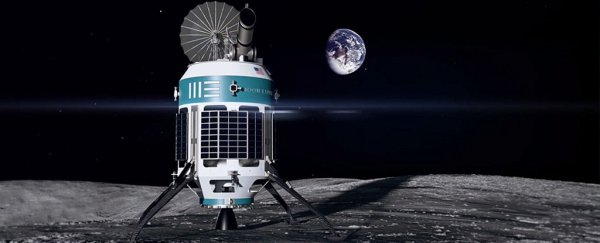If all goes according to plan for Moon Express, we could have the beginnings of a Moon mine as soon as 2020.
First the private Florida-based space exploration company just needs to land a probe on the lunar surface, a feat so far only managed by national space agencies. Should they do it they'll earn a cool US$20 million prize from Google for their efforts.
To Moon Express CEO Bob Richards, the eyes are on the bigger prize, not that a boost in funding would hurt.
"I really hope that we can be in a position to win it," Richards told press at a recent meeting in Washington DC.
"But from our business perspective, it's not a dependency, and it never was. So we will be launching this mission as soon as we can."
The Google Lunar XPrize is a competition intended to encourage entrepreneurs and engineers to aim high and develop a way to privately launch technology onto the Moon's surface.
Winning the main US$20 million prize requires launching a probe that can travel 500 metres (about 1640 feet) along the Moon's surface while sending back images, by the end of 2017. Piece of cake, right?
Moon Express plans on doing this with its Lunar Scout mission. The clock is ticking, though, and the company knows it.
"We have a lot to do in a very short timeframe, and Rocket Lab has a lot to do in a very short timeframe," says Richards, referring to the New Zealand-based US company responsible for sending the spacecraft on its way on its two stage Electron launch vehicle.
Right now three other companies are also in with a chance; Synergy Moon, Team Indus, and Hakuto.
The Japanese team Hakuto have already claimed a US$500,000 milestone prize for developing a rover capable of navigating the Moon's surface.
As a private company that so far has raised around US$45 million in funding, Moon Express applies the same strategy employed by Elon Musk's private venture, SpaceX; reuse whatever they can to keep costs down.
Their current model of lunar lander, the MX-1E, is still in development, with engines currently built and ready for testing. The craft is expected to be capable of delivering a 30 kilogram (66 pound) payload onto the Moon's surface.
Even if there are no hiccoughs in development, launching on schedule is a massive gamble. Rocket Lab has a line-up of missions this year, and there's no guarantee Moon Express will see its Lunar Scout go up before deadline.
Richards remains pragmatic, saying there could be opportunity for some shuffling around of the order. "The main thing is to get the vehicle operational now, then we can talk about when we can be on top of it."
Regardless of whether Moon Express launches in time to win the XPrize's big pot of gold, the company has plans to follow it up with another pair of missions that will put data collection instruments at the Moon's south pole.
Within three years it hopes to have a more advanced MX-2 vehicle roving about as a part of their "Harvest Moon" expedition, collecting samples of soil and rock to send back to Earth in a mission that could pioneer mining operations.
Bringing materials back from space wouldn't just be returning to a scientific frontier – it would push legal and economic boundaries as well.
There isn't a consensus at the moment on how resources mined off world can be used in private ventures. But with national space agencies like NASA stretching their budgets to breaking point, we can expect private enterprises to be looking for ways to fill in the gaps.
Moon rocks brought back by the Apollo missions are considered US National Treasures, with NASA never having given them away to private collectors. Rocks have been stolen, with courts setting their value at US$50,800 per gram based on the cost of retrieving them.
If and when a private venture successfully brings back its own lunar rocks, there'll no doubt be a lot of discussion around space mining rights.
Let's see where Moon Express is in 2020.
